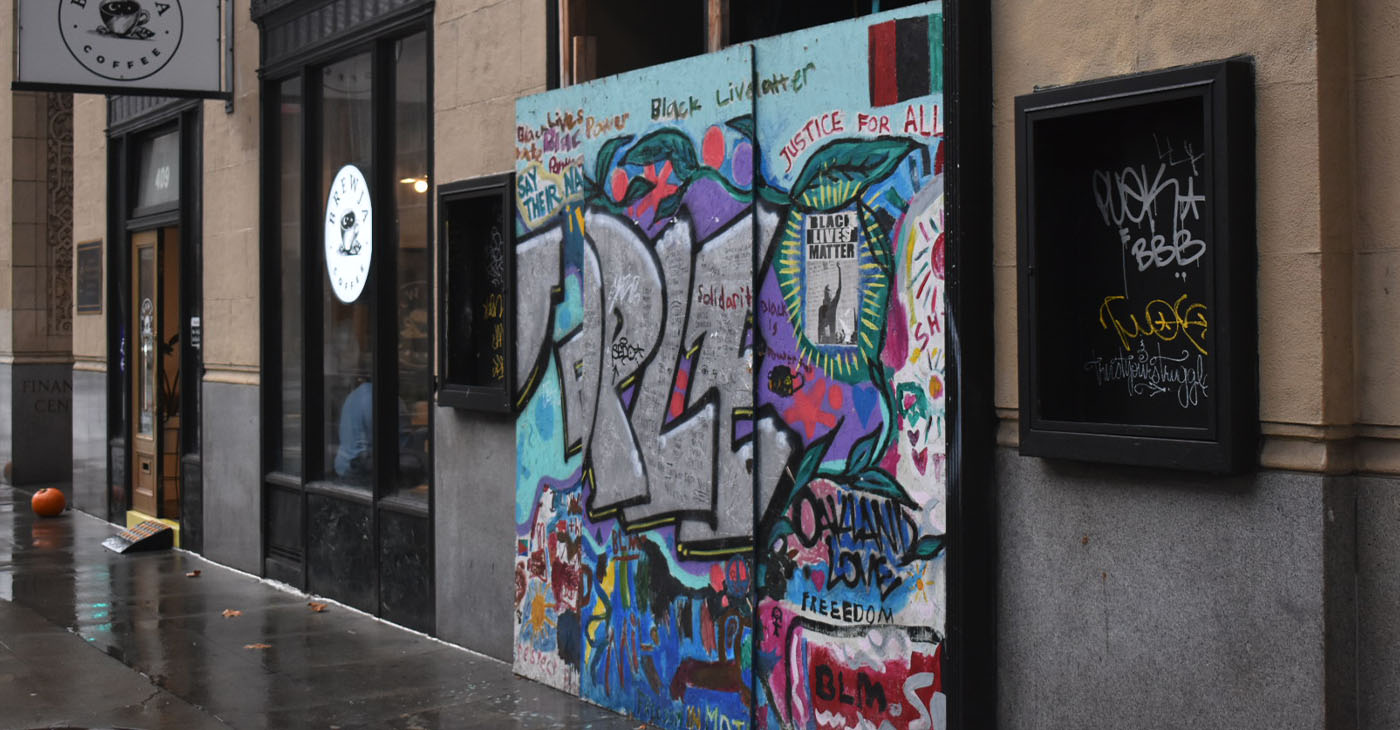Activism
Business Owners Talk Future of Economic Development in Oakland at Downtown Event
The city of Oakland is taking steps to streamline permits for businesses to entice them to stay and bring new projects to the city. Additionally, the city is committing $200 million for affordable housing, which is “unprecedented in the city of Oakland” says Councilmember Nikki Fortunato-Bas, who was also at the event. “We have committed to supporting our community, supporting our local businesses and really showing that we can work together for safer communities,” Fortunato-Bas emphasized in an interview with the Post.

By Magaly Muñoz, Post Staff
Developers and business owners in the Bay Area came together for the “Oakland Structures” event hosted by San Francisco Business Times to discuss economic development projects in Oakland last Thursday.
Mayor Sheng Thao opened up the event as the keynote speaker, sharing her experiences from her first year in office and the measures her administration has taken to address the key issues plaguing the city.
Thao inherited the largest deficit Oakland has ever seen- $360 million- and came into her position as the effects of the COVID-19 pandemic were hitting the city hard. The once bustling city has faced difficulties as people transitioned to hybrid or work-from-home jobs, which has caused foot traffic to slow down and businesses to lose clientele.
“I refuse to stop until we get our businesses back up and running at full capacity, and make sure that people feel safe, not just safe in the commercial corridors, but safe everywhere,” Thao said.
Thao shared that the economic development in Oakland is slowly, but surely, growing as new companies bring their business to downtown. PG&E has recently been among the bigger corporations that’s settled in Oakland, bringing 7,000 jobs with them, which will not only open up potential opportunities for Oaklanders, but also increase foot traffic for businesses in town.
Thao acknowledged several initiatives that have already been implemented to give the city a boost, including Five After Five, a cost-effective parking program; Activate Oakland grants, which gives businesses up to $15,000 to host events that will bring the community to downtown; and the film initiative to encourage filmmakers and TV shows to shoot their projects in Oakland.
The city of Oakland is taking steps to streamline permits for businesses to entice them to stay and bring new projects to the city. Additionally, the city is committing $200 million for affordable housing, which is “unprecedented in the city of Oakland” says Councilmember Nikki Fortunato-Bas, who was also at the event.
“We have committed to supporting our community, supporting our local businesses and really showing that we can work together for safer communities,” Fortunato-Bas emphasized in an interview with the Post.
As the holiday season approaches, Fortunato-Bas urges the community to shop and dine locally, all the way from the Fruitvale to Grand Lake, areas she represents, as this will help boost and support these businesses.
During a panel with investors and business owners who have new projects breaking ground as early as 2024, a pressing question emerged among the attendees and panelists was “Is Oakland the right city to maintain and bring in businesses?”
Real estate developer Riaz Taplin, CEO and founder of Riaz Capital, said that people need to want to come back to the office and revitalize the commercial corridors of the city, but also that businesses need the support of the government sector to thrive.
He feels as though new entrepreneurs who are starting out in Oakland today do not have the advantage that many, like himself, did pre-COVID, where they could just walk into a city office and be helped on how to get the right permits because everything and everyone was so accessible.
More people would feel enticed to come back downtown if they felt that they were safe, so public safety needs to be high on the list of priorities for the city, Taplin said, emphasizing issues such as litter, vandalized business fronts and homeless encampments.
“Something needs to happen to make Broadway a place people want to go,” Taplin said after sharing a story about downtown Alameda being the busiest area with the most foot traffic out of Oakland and San Francisco.
Another panelist, Oakland Roots president Lindsay Barenz, shared that although Oakland is struggling to keep sports teams, the time is now to invest in those projects to keep the sports culture in the city.
“A sports team can be a critical component to that [a place where people enjoy living],” Barenz said.
She emphasized that the Oakland Roots see themselves as significant to the culture of Oakland as institutions like the zoo, museum, and Fairyland. She believes that the morale boost that a sports team can provide is what Oakland needs.
When asked to give a headline of what is to come in Oakland in the next five to 20 years, Taplin said, “Clean it and they will come.”
Activism
Oakland Post: Week of April 24 – 30, 2024
The printed Weekly Edition of the Oakland Post: Week of April 24 – 30, 2024

To enlarge your view of this issue, use the slider, magnifying glass icon or full page icon in the lower right corner of the browser window. ![]()
Activism
Oakland Post: Week of April 17 – 23, 2024
The printed Weekly Edition of the Oakland Post: Week of April 17 – 23, 2024

To enlarge your view of this issue, use the slider, magnifying glass icon or full page icon in the lower right corner of the browser window. ![]()
Activism
Oakland Schools Honor Fred Korematsu Day of Civil Liberties
Every Jan. 30, OUSD commemorates the legacy of Fred Korematsu, an Oakland native, a Castlemont High School graduate, and a national symbol of resistance, resilience, and justice. His defiant stand against racial injustice and his unwavering commitment to civil rights continue to inspire the local community and the nation. Tuesday was “Fred Korematsu Day of Civil Liberties and the Constitution” in the state of California and a growing number of states across the country.

By Post Staff
Every Jan. 30, OUSD commemorates the legacy of Fred Korematsu, an Oakland native, a Castlemont High School graduate, and a national symbol of resistance, resilience, and justice.
His defiant stand against racial injustice and his unwavering commitment to civil rights continue to inspire the local community and the nation. Tuesday was “Fred Korematsu Day of Civil Liberties and the Constitution” in the state of California and a growing number of states across the country.
One OUSD school is named in his honor: Fred T. Korematsu Discovery Academy (KDA) elementary in East Oakland.
Several years ago, founding KDA Principal Charles Wilson, in a video interview with anti-hate organization “Not In Our Town,” said, “We chose the name Fred Korematsu because we really felt like the attributes that he showed in his work are things that the children need to learn … that common people can stand up and make differences in a large number of people’s lives.”
Fred Korematsu was born in Oakland on Jan. 30, 1919. His parents ran a floral nursery business, and his upbringing in Oakland shaped his worldview. His belief in the importance of standing up for your rights and the rights of others, regardless of race or background, was the foundation for his activism against racial prejudice and for the rights of Japanese Americans during World War II.
At the start of the war, Korematsu was turned away from enlisting in the National Guard and the Coast Guard because of his race. He trained as a welder, working at the docks in Oakland, but was fired after the bombing of Pearl Harbor in 1941. Fear and prejudice led to federal Executive Order 9066, which forced more than 120,000 Japanese Americans out of their homes and neighborhoods and into remote internment camps.
The 23-year-old Korematsu resisted the order. He underwent cosmetic surgery and assumed a false identity, choosing freedom over unjust imprisonment. His later arrest and conviction sparked a legal battle that would challenge the foundation of civil liberties in America.
Korematsu’s fight culminated in the Supreme Court’s initial ruling against him in 1944. He spent years in a Utah internment camp with his family, followed by time living in Salt Lake City where he was dogged by racism.
In 1976, President Gerald Ford overturned Executive Order 9066. Seven years later, the 9th Circuit Court of Appeals in San Francisco vacated Korematsu’s conviction. He said in court, “I would like to see the government admit that they were wrong and do something about it so this will never happen again to any American citizen of any race, creed, or color.”
Korematsu’s dedication and determination established him as a national icon of civil rights and social justice. He advocated for justice with Rosa Parks. In 1998, President Bill Clinton gave him the Presidential Medal of Freedom saying, “In the long history of our country’s constant search for justice, some names of ordinary citizens stand for millions of souls … To that distinguished list, today we add the name of Fred Korematsu.”
After Sept. 11, 2001, Korematsu spoke out against hatred and discrimination, saying what happened to Japanese Americans should not happen to people of Middle Eastern descent.
Korematsu’s roots in Oakland and his education in OUSD are a source of great pride for the city, according to the school district. His most famous quote, which is on the Korematsu elementary school mural, is as relevant now as ever, “If you have the feeling that something is wrong, don’t be afraid to speak up.”
-

 Activism4 weeks ago
Activism4 weeks agoOakland Post: Week of March 27 – April 2, 2024
-

 #NNPA BlackPress4 weeks ago
#NNPA BlackPress4 weeks agoBeloved Actor and Activist Louis Cameron Gossett Jr. Dies at 87
-

 Community1 week ago
Community1 week agoFinancial Assistance Bill for Descendants of Enslaved Persons to Help Them Purchase, Own, or Maintain a Home
-

 Activism3 weeks ago
Activism3 weeks agoOakland Post: Week of April 3 – 6, 2024
-

 Business1 week ago
Business1 week agoV.P. Kamala Harris: Americans With Criminal Records Will Soon Be Eligible for SBA Loans
-

 Activism2 weeks ago
Activism2 weeks agoOakland Post: Week of April 10 – 16, 2024
-

 Community1 week ago
Community1 week agoAG Bonta Says Oakland School Leaders Should Comply with State Laws to Avoid ‘Disparate Harm’ When Closing or Merging Schools
-

 Community6 days ago
Community6 days agoOakland WNBA Player to be Inducted Into Hall of Fame























































